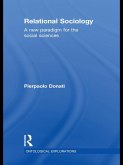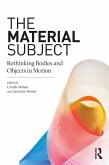Many social theorists now call themselves 'relational sociologists', but mean entirely different things by it. The majority endorse a 'flat ontology', dealing exclusively with dyadic relations. Consequently, they cannot explain the context in which relationships occur or their consequences, except as resultants of endless 'transactions'. This book adopts a different approach which regards 'the relation' itself as an emergent property, with internal causal effects upon its participants and external ones on others. The authors argue that most 'relationists' seem unaware that analytical philosophers, such as Searle, Gilbert and Tuomela, have spent years trying to conceptualize the 'We' as dependent upon shared intentionality. Donati and Archer change the focus away from 'We thinking' and argue that 'We-ness' derives from subjects' reflexive orientations towards the emergent relational 'goods' and 'evils' they themselves generate. Their approach could be called 'relational realism', though they suggest that realists, too, have failed to explore the 'relational subject'.
Dieser Download kann aus rechtlichen Gründen nur mit Rechnungsadresse in A, B, BG, CY, CZ, D, DK, EW, E, FIN, F, GR, HR, H, IRL, I, LT, L, LR, M, NL, PL, P, R, S, SLO, SK ausgeliefert werden.









